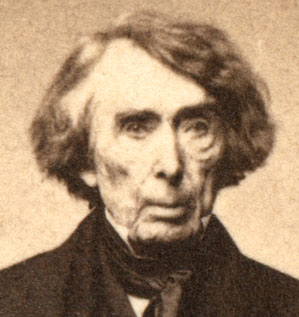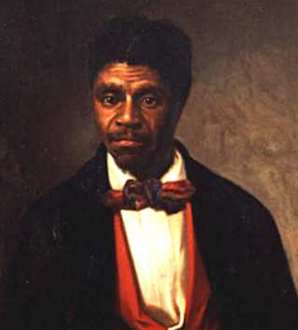

 |
 |
| Chief Justice Roger Taney | Dred Scott |
Dred Scott was a slave who believed he had become free because he had lived in free territory. This idea, that a slave could become free by moving from a slave state to a free state, was so important that abolitionists helped Dred Scott take his case to the U. S. Supreme Court. If the Supreme Court accepted his idea, it would also mean freedom to thousands of slaves in free states.
Dred Scott was born a slave in Virginia in 1795. In 1832 Scott’s owner died and he was sold for $500 to a U.S. Army officer who took Scott to the free state of Illinois in 1834 and on to Wisconsin Territory, which was also free. Later, the doctor returned with Scott to Missouri, a slave state. After the officer died, Scott became the slave of John Sanford. In 1846 Scott began a long legal battle that finally reached the U. S. Supreme Court in 1857.
The chief justice of the Supreme Court, Roger B. Taney, had already shown that he was a supporter of slavery. In 1848, Thomas Garrett, a Delaware Quaker, was arrested for helping Maryland slaves flee from their masters. Taney sat as the judge in the trial and fined Garrett $5,400, then an enormous sum that left Garrett almost penniless. After hearing the sentence, Garrett used the Quaker way of speaking to say to the judge: “Thou has left me without a dollar....I say to thee and to all in this court room, that if anyone knows a fugitive who wants shelter....send him to Thomas Garrett and he will befriend him.”
Had Taney changed his mind by 1857 when in Dred Scott v. John Sanford came before the court? The answer came when the Supreme Court ruled against Scott 7 to 2, with Taney writing the majority opinion. Taney declared that all blacks—free as well as slave—were not and could never become citizens of the United States. The court also declared the 1820 Missouri Compromise unconstitutional, thus permitting slavery in all of the country's territories.
Because Scott was black, Taney wrote, he was not a citizen and therefore had no right to sue. The framers of the Constitution, he wrote, believed that blacks “had no rights which the white man was bound to respect; and that the negro might justly and lawfully be reduced to slavery for his benefit. He was bought and sold and treated as an ordinary article of merchandise and traffic, whenever profit could be made by it.”
Referring to the language in the Declaration of Independence that includes the phrase, “all men are created equal,” Taney said that “it is too clear for dispute, that the enslaved African race were not intended to be included, and formed no part of the people who framed and adopted this declaration. . . .”
The Dred Scott decision, hailed by the slave states, outraged abolitionists, inspiring them to defy federal laws about slaves.
Not long after the decision was handed down, Scott’s owner freed him, but that did not make him a citizen. African Americans would not become undisputed citizens of the United States until the ratification of the 14th Amendment in 1868.